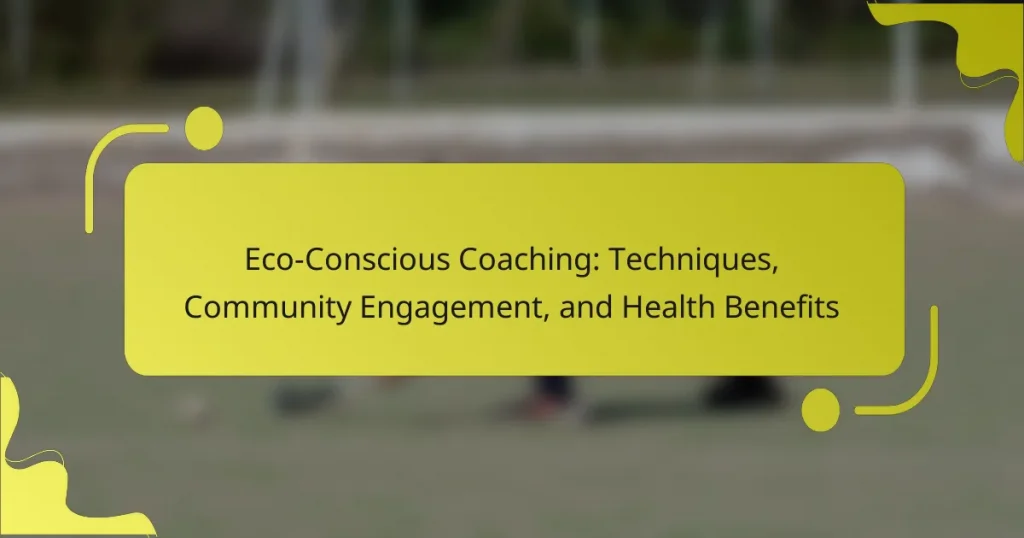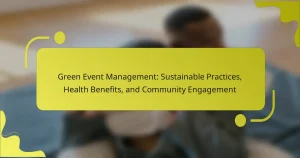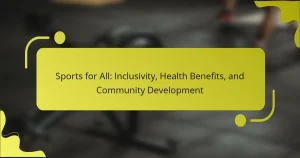Eco-conscious coaching enhances mental well-being and promotes sustainable practices. This approach integrates nature-based techniques, fosters community engagement, and highlights significant health benefits. Coaches face challenges in implementation but can leverage technology to connect with clients and support eco-friendly habits. Engaging in local initiatives strengthens community ties and encourages a commitment to environmental stewardship.
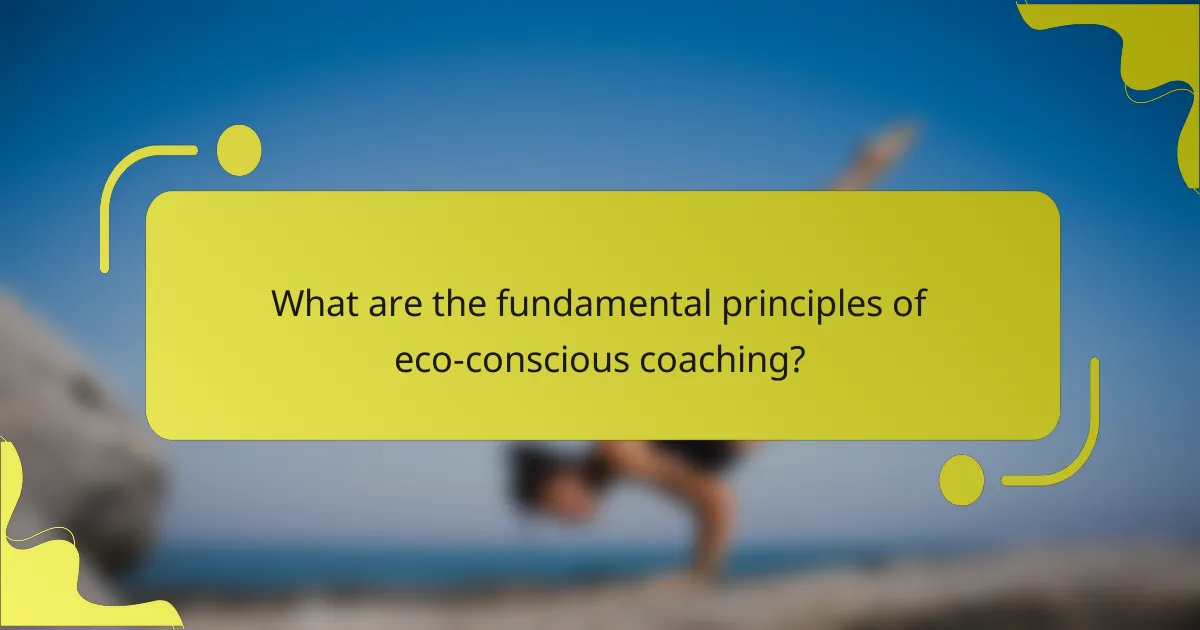
What are the fundamental principles of eco-conscious coaching?
Eco-conscious coaching focuses on sustainability, holistic well-being, and community engagement. Key principles include promoting environmental awareness, fostering individual growth, and encouraging collective action. Techniques involve integrating nature-based practices, utilizing eco-friendly resources, and supporting local initiatives. Health benefits encompass improved mental clarity, reduced stress, and enhanced physical health through active participation in eco-conscious activities.
How does eco-conscious coaching differ from traditional coaching?
Eco-conscious coaching emphasizes sustainability and environmental awareness, unlike traditional coaching. It integrates eco-friendly practices and community engagement into personal development. This approach fosters a deeper connection to nature, promoting holistic well-being. Participants often report enhanced mental clarity and reduced stress levels, linking their personal growth to environmental stewardship.
Why is sustainability a core focus in coaching practices?
Sustainability is a core focus in coaching practices because it fosters holistic well-being and community resilience. Eco-conscious coaching techniques promote environmental awareness and encourage healthier lifestyles. Engaging with the community enhances support networks, leading to collective growth. Additionally, sustainable practices in coaching can improve mental health by reducing stress and fostering a sense of purpose.
Which techniques enhance eco-conscious coaching effectiveness?
Eco-conscious coaching effectiveness is enhanced through techniques that promote sustainability, mindfulness, and community involvement. Integrating nature-based practices fosters deeper connections and awareness. Utilizing eco-psychology principles encourages clients to reflect on their relationship with the environment. Engaging in community projects not only builds support networks but also reinforces shared values and goals. Lastly, incorporating holistic health benefits, such as stress reduction and improved well-being, can motivate clients to adopt eco-conscious behaviors.
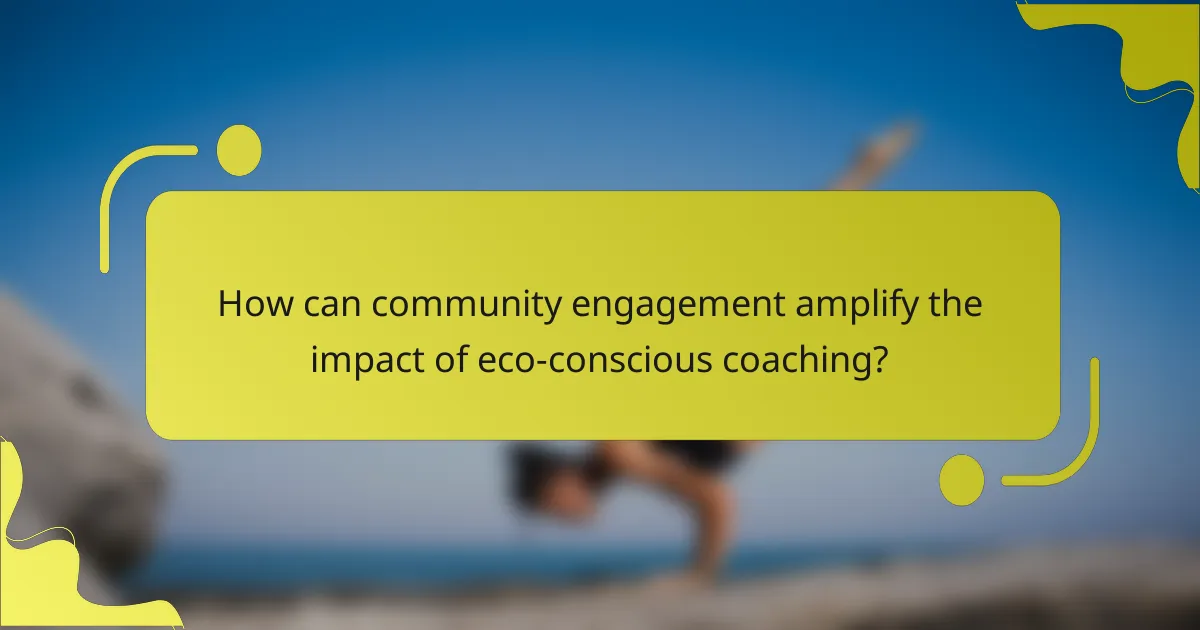
How can community engagement amplify the impact of eco-conscious coaching?
Community engagement significantly amplifies the impact of eco-conscious coaching by fostering collaboration and shared goals. When communities actively participate, they enhance awareness and commitment to sustainable practices. Engaged individuals are more likely to adopt eco-friendly habits, leading to improved health outcomes and a stronger collective impact. Additionally, community-driven initiatives can address unique local environmental challenges, creating tailored solutions that resonate more deeply with participants. This synergy between coaching and community involvement cultivates a supportive environment, reinforcing the principles of eco-conscious living.
What role do local organizations play in eco-conscious coaching initiatives?
Local organizations are crucial in eco-conscious coaching initiatives by fostering community engagement and promoting sustainable practices. They provide resources, support networks, and training programs that empower individuals to adopt eco-friendly lifestyles. Through workshops and events, these organizations facilitate knowledge sharing and collaboration among community members. Additionally, they often partner with local businesses to create incentives for sustainable choices, enhancing the overall impact of eco-conscious coaching efforts. This collaboration strengthens community ties and amplifies the reach of eco-conscious initiatives.
How can coaching programs foster collaboration within communities?
Coaching programs can significantly enhance collaboration within communities by fostering shared goals and mutual support. These programs encourage participants to engage in eco-conscious practices, promoting a collective commitment to sustainability. By utilizing techniques such as group workshops and community challenges, coaching facilitates open communication and strengthens relationships among members. As a result, participants not only improve their individual health and well-being but also contribute to a more cohesive community focused on environmental stewardship.
Which outreach strategies promote eco-conscious coaching to a wider audience?
Utilizing diverse outreach strategies can effectively promote eco-conscious coaching to a wider audience. Engaging social media campaigns, community workshops, and partnerships with local environmental organizations can broaden visibility.
1. Leverage social media platforms to share success stories and eco-friendly tips.
2. Organize community workshops that emphasize the health benefits of eco-conscious living.
3. Collaborate with local businesses to host joint events focused on sustainability.
4. Create informative content, such as blogs and videos, that highlight eco-conscious coaching techniques.
5. Encourage word-of-mouth referrals by incentivizing clients to share their experiences.
6. Utilize email newsletters to keep the community informed about events and eco-friendly practices.

What are the health benefits associated with eco-conscious coaching?
Eco-conscious coaching offers numerous health benefits, including improved mental well-being, enhanced physical health, and stronger community connections. Engaging in eco-conscious practices reduces stress and anxiety, promoting a sense of purpose. Additionally, participation in community initiatives fosters social support, which is crucial for emotional resilience. Research shows that individuals involved in eco-friendly activities report higher levels of life satisfaction and overall happiness. These benefits contribute to a holistic approach to health, intertwining environmental stewardship with personal wellness.
How does eco-conscious coaching improve mental well-being?
Eco-conscious coaching significantly enhances mental well-being by fostering a connection with nature and promoting sustainable practices. This coaching approach encourages mindfulness, reduces stress, and enhances emotional resilience. Engaging with eco-friendly communities also creates a support network, which is vital for mental health. Furthermore, studies indicate that spending time in natural environments can lower anxiety and improve overall mood, reinforcing the mental health benefits of eco-conscious living.
What physical health advantages can be linked to eco-conscious practices?
Eco-conscious practices can significantly enhance physical health by promoting better nutrition, increased physical activity, and improved mental well-being. Engaging in sustainable practices often leads to a diet rich in whole foods, which benefits overall health. Participation in community activities fosters social connections and encourages regular exercise, contributing to cardiovascular health. Additionally, eco-conscious living reduces stress through a stronger connection to nature, which has been linked to lower blood pressure and improved mood.
Which demographic groups benefit most from eco-conscious coaching?
Young adults, families, and environmentally conscious individuals benefit most from eco-conscious coaching. These groups often seek sustainable lifestyle changes and community engagement. Young adults are motivated by social responsibility, while families desire eco-friendly practices for future generations. Environmentally conscious individuals aim to deepen their understanding of sustainable living. Coaching provides tailored strategies, enhancing their impact on the community and personal health.
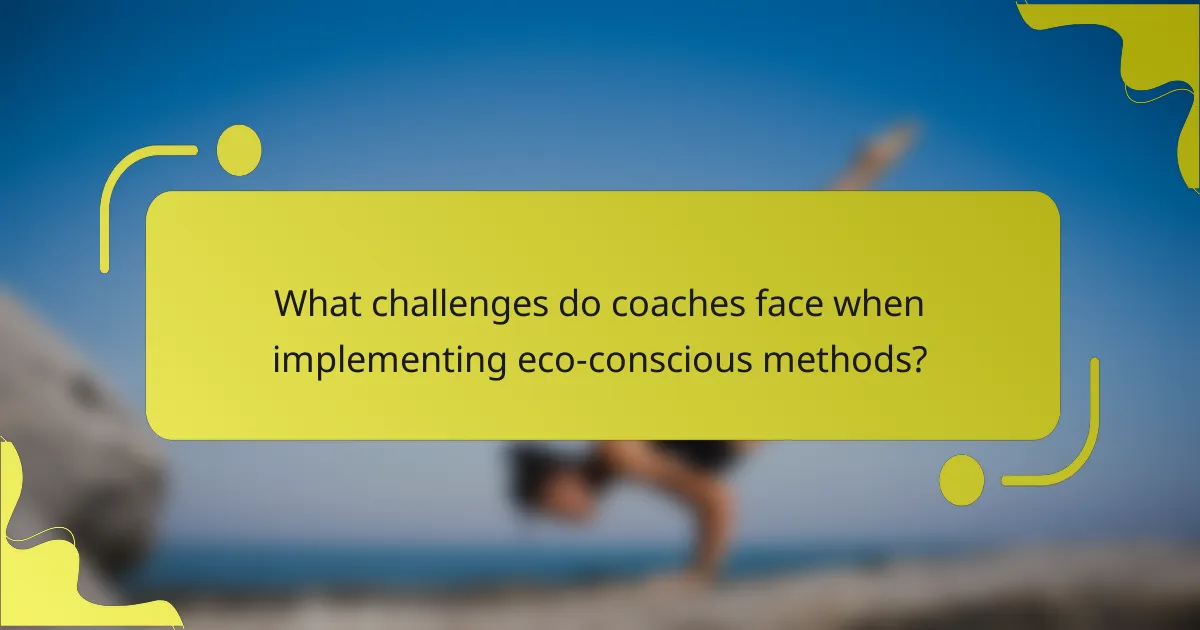
What challenges do coaches face when implementing eco-conscious methods?
Coaches face several challenges when implementing eco-conscious methods, including resistance from clients, lack of resources, and insufficient training. These obstacles can hinder the adoption of sustainable practices in coaching. For example, clients may prioritize performance over environmental impact, making it difficult for coaches to promote eco-friendly techniques. Additionally, limited access to sustainable materials and facilities can restrict implementation. Coaches may also lack the necessary knowledge to effectively integrate eco-conscious methods into their programs, which can lead to inconsistent practices.
How can coaches overcome resistance to eco-friendly practices?
Coaches can overcome resistance to eco-friendly practices by fostering open dialogue, demonstrating tangible benefits, and providing support. Engaging clients through education about environmental impact encourages acceptance. Highlighting health benefits, such as improved well-being from sustainable practices, can also motivate change. Building a community around eco-conscious values creates a supportive environment that reinforces commitment.
What are common misconceptions about eco-conscious coaching?
Many believe eco-conscious coaching is solely about environmentalism, but it encompasses personal growth and community well-being. A common misconception is that it lacks structure; in reality, it employs various techniques to foster sustainable habits. Some think it appeals only to a niche audience, yet its principles resonate across diverse demographics. Additionally, many assume it offers limited health benefits, whereas studies show improved mental and physical health outcomes.
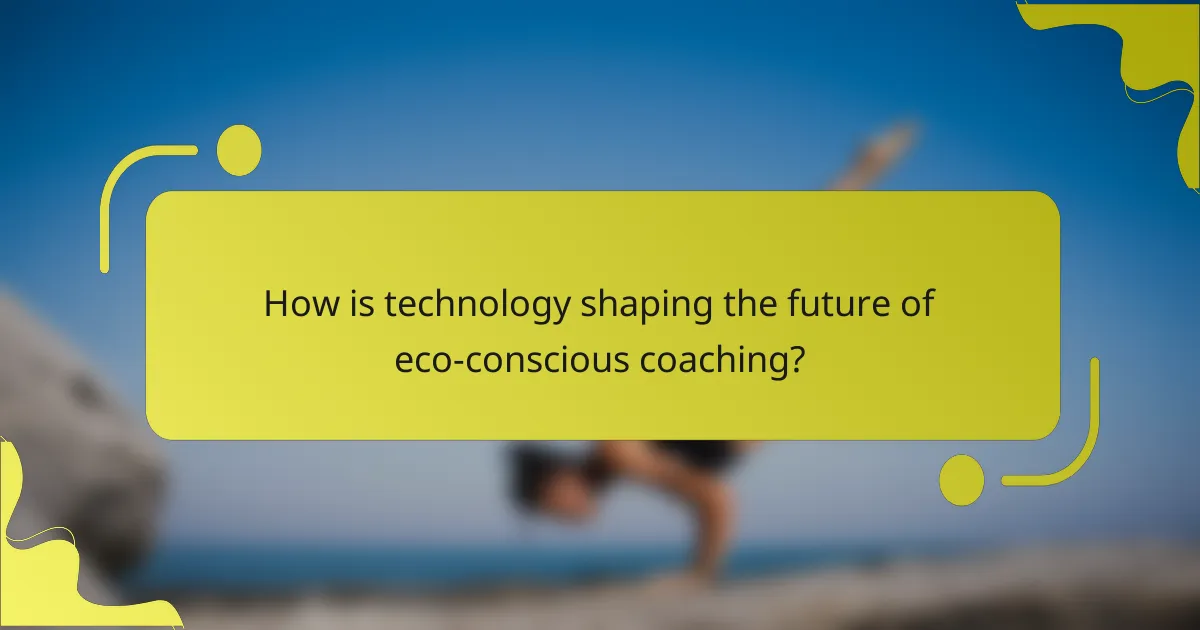
How is technology shaping the future of eco-conscious coaching?
Technology is revolutionizing eco-conscious coaching by enhancing accessibility and community engagement. Digital platforms facilitate connections among coaches and clients, promoting sustainable practices. Virtual tools, like apps for tracking environmental impact, empower individuals to make informed choices. Moreover, online communities foster support networks, amplifying the health benefits of eco-conscious lifestyles.
Which digital tools support eco-conscious coaching methodologies?
Digital tools that support eco-conscious coaching methodologies include platforms for virtual coaching, community engagement apps, and sustainability tracking software. These tools enhance client interaction and promote environmental awareness. Examples include Zoom for coaching sessions, Slack for community discussions, and MyEco for tracking personal sustainability efforts. Each tool fosters a collaborative environment, aligning with eco-conscious values.
How can social media enhance community engagement in coaching?
Social media enhances community engagement in coaching by fostering connections, sharing resources, and facilitating discussions. Coaches can utilize platforms to create supportive networks, promote eco-conscious practices, and encourage collective learning. Engaging content, such as videos and webinars, can attract participation and strengthen community ties. Additionally, social media allows for real-time feedback, enabling coaches to adapt their approaches based on community needs.

What best practices should coaches adopt for effective eco-conscious coaching?
Coaches should adopt sustainable practices, community involvement, and a holistic approach to promote eco-conscious coaching. Emphasizing techniques like nature-based training can enhance client connection to the environment. Engaging with local communities fosters awareness and support for eco-friendly initiatives. Highlighting health benefits, such as improved mental well-being from outdoor activities, encourages clients to embrace eco-conscious lifestyles.
How can ongoing education improve eco-conscious coaching techniques?
Ongoing education enhances eco-conscious coaching techniques by providing updated knowledge and practices. Continuous learning fosters innovative strategies that align with sustainability goals. It also encourages collaboration within communities, enhancing engagement and accountability. Furthermore, it equips coaches with the latest research on health benefits, promoting holistic well-being in eco-conscious initiatives.
What common mistakes should coaches avoid in eco-conscious practices?
Coaches should avoid common mistakes that undermine eco-conscious practices. These include neglecting local community involvement, failing to educate clients on sustainability, overlooking eco-friendly materials, and not measuring the environmental impact of their coaching methods. Engaging with the community fosters a supportive network, while education promotes awareness and responsibility. Using sustainable materials enhances credibility, and measuring impact ensures accountability in eco-conscious coaching.
